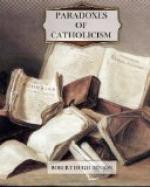But it is easy to lose the proportion of truth, if we spiritualize everything, and pass over, as if unworthy of consideration, His bodily pain. For this Thirst of the Crucified is the final sum of all the pains of crucifixion: the physical agony, the fever produced by it, the torrential sweat, the burning of the sun—all these culminated in the torment of which this Cry is His expression.
Bodily pain, then, since Jesus not only deigned to suffer it, but to speak of it, is as much a part of the Divine process as the most spiritual of derelictions: it is an intense and a vital reality in life. It is the fashion, at present, to pose as if we were superior to such things; as if either it were too coarse for our high natures or even actually in itself evil. The truth is that we are terrified of its reality and its sting, and seek, therefore, to evade it by every means in our power. We affect to smile at the old penances of the saints and ascetics as if we ourselves had risen into a higher state of development and needed no longer such elementary aids to piety!
Let this Word, then, bring us back to our senses and to the due proportions of truth. We are body as well as soul; we are incomplete without the body. The soul is insufficient to itself, the body has as real a part to play in Redemption as the soul which is its inmate and should be its mistress. We look for the redemption of our body and the Resurrection of the Flesh, we merit or demerit before God in our soul for the deeds done in our body.
So was it too with our Lord of His infinite compassion. The Word was made Flesh, dwelt in the Flesh, has assumed that Flesh into heaven. Further, He suffered in the Flesh and deigned to tell us so; and that He found that suffering all but intolerable.
II. In a well-known book a Catholic poet[1] describes with a great deal of power the development of men’s nervous systems in these later days, and warns his readers against a scrupulous terror lest they, who no longer scourge themselves with briers, should be neglecting a means of sanctification. He points out, with perfect justice, that men, in these days, suffer instead in more subtle manners than did those of the Middle Ages, yet none the less physical; and puts us on our guard lest we should afflict ourselves too much. Yet we must take care, also, that we do not fall into the opposite extreme and come to regard bodily pain, (as has been said) as if it were altogether too elementary for our refined natures and as if it must have no place in the alchemy of the spirit. This would be both dangerous and false. What God hath joined together, let no man put asunder! For, if we once treat body and soul as ill-matched companions and seek to deal with them apart, instantly the door is flung open to the old Gnostic horrors of sensualism on the one side or inhuman mutilation or neglect on the other.
[Footnote 1: Health and Holiness by Francis Thompson.]




